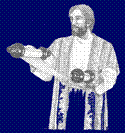|
Priesthood of all believers?
Christendom should be applauded for its commitment to Jesus Christ as mankind's Savior and Lord and its recognition of His divine origin. After that. well. it doesn't have a lot to commend it. Inasmuch as it holds that God no longer identifies Himself with fleshly Israel in any special way, Christendom rejects the One Who sent Jesus - the Holy One of Israel. To treat this error as a trifle merely serves to highlight its seriousness. Christendom acknowledges that Jesus Christ's own legitimacy as King is based on God's promise to King David that the only monarchy that would enjoy the seal of divine authority would be the royal line of David (2 Samuel 7:11-16) ruling over Israel; Jesus Christ was a legal descendant of David. That this monarchy was created to rule over fleshly Israel is made clear in David's prayer of thanks:
Therefore You are great, O Lord God. For there is none like You, nor is there any God besides You, according to all that we have heard with our ears. And who is like Your people, like Israel, the one nation on the earth whom God went to redeem for Himself as a people, to make for Himself a name - and to do for Yourself great and awesome deeds for Your land - before Your people whom You redeemed for Yourself from Egypt. For You have made Your people Israel Your very own people forever; and You, Lord, have become their God. Now, O Lord God, the word which You have spoken concerning Your servant and concerning his house, establish it forever and do as You have said. So let Your name be magnified forever, saying, "The Lord of hosts is the God over Israel." And let the house of Your servant David be established before You (2 Sam. 7:22-26).
Shortly before this famous Davidic covenant was made, David had been made aware that, "the LORD had established him as king over Israel, and that He had exalted His kingdom for the sake of His people Israel" (2 Sam. 5:12). Though Jesus is ultimately to be king over all nations (Zech. 14:9), Israel will always constitute His special, chosen nation (see Acts 1:6).
The kingdom "belongs to" Israel. To Israel God had earlier made a staggering promise:
Now therefore, if you will indeed obey My voice and keep My covenant, then you shall be a special treasure to Me above all people; for all the earth is Mine. And you shall be to Me a kingdom of priests and a holy nation (Ex. 19:5-6).
Moses did not explain what the role of "kingdom of priests" would entail, and we are therefore left wondering. Did God mean that Israel would minister, in the sense of performing religious duties, to Himself, or was He hinting at some kind of evangelistic responsibility Israel would have towards other nations? Who can say? Let us just note the statement and move on without seeking to unpack its specifics. What
|
are we to make, then, of Peter's usage of this Scripture in his epistle?
. you also, as living stones, are being built up a spiritual house, a holy priesthood, to offer up spiritual sacrifices acceptable to God through Jesus Christ. But you are a chosen generation, a royal priesthood, a holy nation, His own special people, that you may proclaim the praises of Him who called you out of darkness into His marvelous light. (1 Peter 2:5, 9).
Both Catholic and Protestant theology insist that these words show that every disciple of Jesus Christ, including non-Israelites, now has a "royal priesthood", the idea being commonly referred to as "The priesthood of all believers". However, this interpretation requires that Peter was giving a totally new meaning to the plain and simple meaning of the Exodus passage; such a brittle and fragile interpretive methodology shatters at the slightest touch. Why don't theologians accept this passage at its face value? Peter is telling his believing Israelite audience that whatever Moses meant about Israel's special role continues; they must take their calling as God's royal priesthood seriously. The entire thrust of 1 Peter shows plainly that it is written specifically to an audience of Israelite disciples of Jesus Christ. What could be more telling than the book's opening words?
Peter, an apostle of Jesus Christ, To the [elect] pilgrims of the Dispersion [Gk: diaspora] in Pontus, Galatia, Cappadocia, Asia, and Bithynia.
The Greek term "diaspora" is recognized by all as referring to Jews living outside the pale of the Promised Land. Notice also 2:12:
.having your conduct honorable among the Gentiles , that when they speak against you as evildoers, they may, by your good works which they observe, glorify God in the day of visitation.
The recipients are specified as being "among Gentiles", strongly implying that they are not Gentiles themselves. Perhaps these words help us understand better what the role of a "holy priest" consisted of; their non-Jewish neighbors would see their example of godliness and acknowledge Jesus Christ and, by extension, the Holy One of Israel. Another passage suggests that even within the church a distinction in roles between Jewish members and non-Jewish members was recognized:
For if the Gentiles have been partakers of their spiritual things, their duty is also to minister to them in material things (Rom. 15:27).
We will make no attempt here to analyze the staggering implications of these observations. Suffice it to say that the New Testament's teachings are consistent with those of the Old Testament on this topic of vital importance.
|




